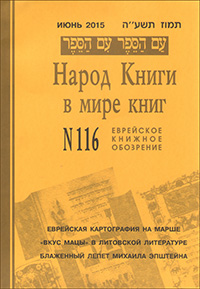The People of the Book in the World of Books is a Russian bimonthly publication for serious readers with Jewish interests. Our English website includes only the summaries of the published articles. To access the complete text of them, please visit the Russian version of this website.

|
||
|
This issue of the magazine includes:
• Survey: The Jewish Globe
This survey takes a look at the schematic maps published by various local Jewish communities in post-Soviet countries in recent years. This method of self-representing community organizations and their leaders is not as widespread as historical books, booklets or postcards but still popular enough to be seen as a distinct phenomenon. The fundamental nature of a map forces its publishers to present a city or a country in its entirety and then endow it with Jewish significance, using various keys and illustrations to mark the intersection of Jewish and non-Jewish places of interest or wrest a special “Jewish” meaning from universal cultural monuments. In other words, the Jewish schematic map’s task is to help the modern traveler read the local text of a city or country as a “Jewish” text. The author of the article ironically compares the maps he has analyzed with the famous book by Benjamin of Tudela. This medieval Jewish traveler visited many countries of Europe, Asia, and Africa, leaving to posterity a precise description of their Jewish communities while ignoring almost everything that had nothing to do with Jews. “In some sense, nothing has changed since the times of Benjamin,” concludes the reviewer.
• Looking through Russian Literary Magazines: Novels and Articles of Jewish Interest
• Response: Stale Broken Bread
This sharply worded essay criticizes a lengthy article by Russian philosopher Mikhail Epstein, published in the Petersburg literary monthly Zvezda. In his piece, Epstein had tried to persuade readers of the metaphysical “congeniality of Russian and Jewish souls,” while demonstrating his own total ignorance of Judaism and Jewish history and culture.
• Jewish Calendar of Significant Dates: July–August 2015
• Bibliography: 55 New Books |


